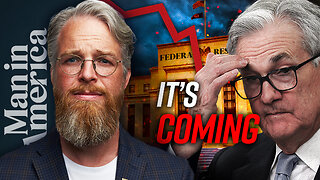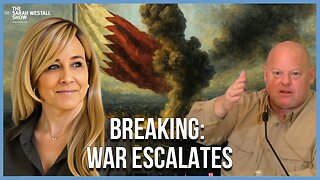Premium Only Content

Episode 3207: From Adam to Modern Man: The Decline of Human Intelligence
www.catholic-reboot.com
Nightly Zoom Coordinates for Rosary:
Meeting ID: 865 8978 0399
Passcode: Wjjv4960!
Speak Lord for your Servant is Listening
Book Recommendation of the Day
Scientism and Secularism: Learning to Respond to a Dangerous Ideology
By J. P. Moreland
• What it covers: Moreland, a well-respected Christian philosopher, dissects scientism the modern cultural belief that the natural sciences are the only legitimate path to knowledge. He explains how this worldview undermines faith and even the foundations of scientific reasoning itself. Moreland demonstrates why scientism is self-refuting and offers tools for Christians to counter this ideology while defending the harmony between faith and reason.
From Adam to Modern Man: The Decline of Human Intelligence
My friends, we live in an age where man has abandoned God and seeks his salvation in false messiahs. Instead of kneeling before Christ the King and His Holy Church, modern man bows before government, before science, and before the so-called “experts.” He has traded the light of the Gospel for the cold promises of bureaucracy and technology.
And what has been the result? Broken families, confusion of identity, loss of faith, and a Church that too often echoes the world instead of correcting it.
Why Man Looks to Government and Science
Modern man has convinced himself that every question can be solved by man alone. “Pass another law, fund another program, invent another machine, run another experiment” this is the creed of our times.
Yet Scripture has already told us where this path leads:
“Cursed be the man that trusteth in man, and maketh flesh his arm, and whose heart departeth from the Lord.” (Jeremiah 17:5)
The Israelites fell into this error when they demanded a king “like all the other nations.” (1 Samuel 8:5) Today, we repeat their folly, trusting in political leaders, economic systems, and scientists, while ignoring the one true Savior, Jesus Christ.
The Church’s Complicity
And here is the wound that cuts deepest: much of the modern Catholic Church has followed the world into this same delusion. Instead of boldly proclaiming the Kingship of Christ, we hear endless talk of climate, immigration policy, equity, dialogue, and synodality as though salvation comes from committees and programs rather than from the Cross.
St. Pius X warned us clearly:
“Modernists...lay the axe not to the branches and shoots, but to the very root, that is, to the faith and its deepest fibers.” (Pascendi Dominici Gregis, 3)
The danger is not only from outside it is within. When shepherds imitate the world, they cease to lead souls to Christ.
Framing the Episode
That is why today’s episode is so vital. We will expose the lie that humanity is growing more intelligent by its own efforts. In truth, man has been declining ever since Adam fell. The more he trusts in himself, the less he understands.
We will see how Adam’s mind was created brilliant and clear, how sin darkened that brilliance, how false science and false religion deepen the confusion, and how true wisdom can only be found in Christ and His Holy Church.
Because the Catholic truth is this: the only real progress is not marching with the world, but returning to Christ, the Eternal Wisdom, and to His Bride, the Church, the pillar and ground of truth. (1 Timothy 3:15)
Introduction
We live in an age where people boast of “progress,” where the advancement of technology and science is mistaken for an advancement of the human mind itself. But Sacred Scripture, the Fathers of the Church, and reason itself all testify that man is not becoming more intelligent since Adam, but less.
The modern world confuses the multiplication of gadgets with wisdom, the growth of data with intelligence, and technical skill with true understanding. Yet, in God’s plan, man was created in perfection endowed with supernatural grace, infused knowledge, and clarity of mind. What we see today is not ascent, but descent.
Segment 1: Adam’s Original Intelligence
• Scriptural Foundation: Genesis 2:19–20 tells us Adam named all the animals. This was not mere labeling, but an act of profound understanding of each creature’s nature.
• Patristic Commentary: St. John Chrysostom taught that Adam was given a mind far superior to ours, free from confusion and error, capable of penetrating truths we now only glimpse.
• The Fall’s Effect: With original sin, man’s intellect was darkened. While Adam saw reality with clarity, we now see “through a glass darkly” (1 Corinthians 13:12).
Key Point: Man began with intellectual brilliance and spiritual harmony, but sin dimmed both reason and memory.
Setting the Stage: The First Man’s Mind
When we think of Adam, most of us picture the Garden of Eden, the trees, the animals, and that first act of disobedience. But rarely do we stop to ask: What kind of mind did Adam possess before the Fall?
Scripture and Tradition tell us clearly: Adam was not a primitive caveman gradually learning how to survive. No Adam was created in perfection, endowed with extraordinary intelligence, infused knowledge, and clarity of reason. He was, as the Fathers say, “the crown of creation.”
Naming the Animals (Genesis 2:19–20)
The most obvious testimony comes from Genesis:
“And the Lord God having formed out of the ground all the beasts of the earth, and all the fowls of the air, brought them to Adam to see what he would call them: for whatsoever Adam called any living creature, the same is its name.”
At first glance, this may look like Adam was just making up labels, the way a child names a pet. But the Church Fathers insist otherwise. Naming, in the biblical sense, is not arbitrary it reveals the essence, the nature, of the thing.
• St. John Chrysostom points out that Adam, without prior experience, had the ability to look into the very nature of each animal and assign a fitting name. This shows an intellect of astonishing clarity, capable of perceiving reality directly.
• St. Ephrem the Syrian adds that Adam’s naming was prophetic, not whimsical his mind grasped creation as God had made it, and his words reflected that truth.
Compare this to us today: even with microscopes, DNA sequencing, and libraries, we struggle to understand the nature of living things. Adam, in his innocence, saw directly.
Infused Knowledge Given by God
Catholic theology holds that Adam was created with infused knowledge. That is, God Himself gave Adam understanding that went far beyond what we gain through trial and error.
• St. Thomas Aquinas (Summa Theologica, I, q. 94) teaches that Adam had knowledge sufficient for his state: he knew God, the moral law, the nature of creation, and how to live in harmony with it.
• This was not omniscience Adam did not know every scientific fact. But he had clear, certain, and true knowledge of the essentials needed to govern creation and guide his descendants.
Think of it like this: Adam began where humanity should have ended at the height of intellectual strength. We, by contrast, begin ignorant and must painfully relearn even the basics of life and virtue.
Intelligence Before the Fall vs. After
The contrast between Adam’s intelligence before and after the Fall is striking:
• Before the Fall: his reason ruled over his passions; his memory was sharp; his will was steady. His intellect was unclouded by error or prejudice. He lived in harmony with God’s law and creation.
• After the Fall: original sin darkened the intellect, weakened the will, and disordered the passions. St. Augustine describes this as a “wounding of the faculties”: ignorance in the intellect, malice in the will, weakness in the heart, and concupiscence in the body.
This explains why humanity is not advancing toward intellectual perfection but rather declining. We struggle with confusion, forgetfulness, contradiction, and error all symptoms of our fallen state.
Evidence from Early Human Civilization
Modern man often claims our ancestors were primitive and unintelligent. Yet Sacred Tradition and even secular history reveal otherwise:
• The early descendants of Adam built cities (Genesis 4:17), practiced music and metallurgy (Genesis 4:21–22). These are not the signs of primitive cavemen, but of brilliant, God-gifted intelligence.
• Ancient monuments like the pyramids or the megaliths still puzzle modern engineers. Could this not reflect the remnants of Adam’s original gifts, passed on but gradually diminished?
Far from being slow learners, the first men were closer to Adam’s brilliance and thus more advanced in many respects than we are today.
Theological Implications
Why is this important? Because it reminds us that man’s true dignity lies not in his “progress” but in his creation in God’s image.
• Adam’s intelligence was a reflection of God’s Wisdom. To know the truth clearly is a participation in the Divine Light.
• The Fall corrupted the image. Our minds became clouded, but not destroyed. Christ, the New Adam, came to restore that clarity, especially through the gift of faith and the light of grace.
• This also shows why Tradition is so vital: we are not “discovering truth” as if it never existed; we are recovering what was given from the beginning and passed down through the Church.
Reflection for Listeners
As Catholics, we should not be dazzled by the myth of human progress. We should see clearly: the first man, Adam, possessed greater intelligence than any of us, but he lost clarity through sin. We are not rising up, but fallen down. Our hope is not in evolution, but in Christ the New Adam who restores the mind to its true end: knowing and loving God.
Setting the Stage: The First Man’s Mind
When God created Adam, He did not fashion a primitive brute, but a man of dazzling intellect. The Fathers remind us that Adam was the masterpiece of creation.
St. John Damascene teaches:
“Adam was created in full maturity, in the perfection of knowledge and reason.” (De Fide Orthodoxa, II.30)
This means Adam’s mind was not like ours slow to develop, dependent on years of learning but clear, infused, and perfectly ordered.
Naming the Animals (Genesis 2:19–20)
Genesis tells us:
“And whatsoever Adam called any living creature, the same is its name.” (Gen 2:19–20)
The Fathers saw this as evidence of Adam’s extraordinary intellectual gifts.
• St. John Chrysostom explains:
“He did not learn from another what to call them, but he spoke as a prophet, penetrating into the very nature of each creature.” (Homilies on Genesis, 14)
• St. Ephrem the Syrian likewise notes:
“Adam looked into the essence of the animals, and by the wisdom given to him, he named them according to their nature.” (Commentary on Genesis, 2.10)
For us, names are often arbitrary. But for Adam, naming was an act of knowledge his mind grasped reality as it truly was.
Infused Knowledge Given by God
Theologians teach that Adam was given infused knowledge at creation. This is not mere learning, but wisdom placed directly into the soul by God.
St. Thomas Aquinas writes:
“In the state of innocence man had knowledge of everything that was necessary for the direction of human life, in matters of faith and morals, and in the governance of the world.” (Summa Theologica, I, q.94, a.3)
This means Adam knew the moral law, the order of creation, and how to live harmoniously with God’s plan. He was not omniscient, but he began where we could only hope to end.
Intelligence Before the Fall vs. After
Before the Fall, Adam’s faculties were perfectly ordered: reason ruled over the senses, memory was clear, and the will was steadfast.
After the Fall, all of this was wounded. St. Augustine describes the effect of original sin:
“The punishment for sin was the loss of wisdom, the clouding of the intellect, and the wandering of the mind.” (De Civitate Dei, XIII.13)
Aquinas calls this the “four wounds” of original sin: ignorance in the intellect, malice in the will, weakness in the passions, and concupiscence in the body (ST I–II, q.85, a.3).
Thus, where Adam once saw clearly, we now grope in shadows.
Evidence from Early Human Civilization
The myth of “primitive man” collapses when we read Genesis.
• Cain builds a city (Gen 4:17).
• Jubal is “the father of those who play the harp and organ” (Gen 4:21).
• Tubalcain forges tools of brass and iron (Gen 4:22).
This is not primitive survival, but the flowering of Adam’s inherited intelligence.
Even pagan philosophers glimpsed this truth. Cicero admitted:
“There was once a time when men lived without law, but not without reason.” (De Legibus, I.7)
If pagan Rome knew this, how much more do we, as Christians, recognize the remnants of Adam’s original brilliance in early civilization?
Theological Implications
Adam’s intelligence is not just a historical curiosity—it teaches us about our dignity and our fall.
• St. Augustine:
“Thou hast made us for Thyself, O Lord, and our heart is restless until it rests in Thee.” (Confessions, I.1)
This applies not only to our hearts but also to our minds. Our intelligence was made to rest in the truth of God.
• St. Thomas Aquinas:
“The light of natural reason is itself a participation in the Divine Light.” (ST I, q.12, a.11 ad 3)
When Adam fell, that light was dimmed. But Christ, the New Adam, restores it through faith and grace.
Reflection for Listeners
So what does this mean for us today?
It means we must not fall for the myth of human “progress.” We are not climbing to greater intelligence than our first father. On the contrary, we have descended from his brilliance into confusion. Our hope is not in technology or evolution, but in Christ, the Eternal Word, who renews the human mind.
Segment 2: The Great Decline in Human Understanding
• Tower of Babel (Genesis 11): Instead of progress, pride fractured human speech and understanding. Division of tongues was a punishment that hindered unity of knowledge.
• Wisdom vs. Knowledge: The ancients, even pagans like Aristotle, possessed remarkable philosophical insight. Compare this with our age: abundant information, yet confusion reigns about the most basic truths—marriage, life, man and woman.
• The Fathers’ Teaching: St. Augustine in City of God explained that as humanity turned from God, its wisdom turned into folly.
• Modern Man: Boasts of evolution of mind, yet cannot define truth. He builds rockets but cannot govern his passions. He splits the atom but cannot defend the family.
Key Point: Each century shows not progress of intellect, but corruption of memory and loss of wisdom.
1. Opening Contrast: Wisdom Lost (≈2 minutes)
The modern world insists that man has grown wiser through science, technology, and progress. Yet, the evidence of both Scripture and Tradition shows the opposite: the farther man drifts from God, the less he understands reality.
St. Paul warns us:
“Professing themselves to be wise, they became fools.” (Romans 1:22)
This is the story of fallen humanity: pride promises enlightenment, but delivers only confusion.
________________________________________
2. The Tower of Babel: The Breaking of Human Unity (≈3 minutes)
The Tower of Babel is a powerful image of intellectual decline.
“Therefore is the name thereof called Babel, because there the language of the whole earth was confounded.” (Genesis 11:9)
The Fathers explain that Babel was not simply about language, but about the scattering of human thought.
• St. Augustine:
“The city of man, swollen with pride, sought unity apart from God. Therefore God struck them with division of tongues, that their agreement in evil might be broken.” (City of God, XVI.4)
• St. John Chrysostom:
“The confusion of tongues was a sign of their confused minds, for men who would not listen to God could not listen to each other.” (Homily on Genesis, 30)
Thus, instead of advancing toward higher unity of truth, man fell into division, misunderstanding, and fragmentation.
3. Wisdom vs. Knowledge
One of the greatest errors of our age is to confuse knowledge with wisdom.
• The ancients, even pagans like Aristotle, sought wisdom: the contemplation of truth, the pursuit of the highest causes.
• Modern man amasses endless data, but cannot answer the simplest moral questions.
St. Thomas Aquinas clarifies:
“Knowledge is the apprehension of truth, but wisdom judges according to the highest cause, which is God.” (ST II-II, q.45, a.1)
This explains why the ancients could build a coherent philosophy of life, while modern man, with libraries and computers, cannot define marriage, gender, or even life itself.
4. The Fathers on Decline of Understanding (≈3 minutes)
The Fathers consistently warned that sin clouds the mind.
• St. Augustine:
“The light of truth is withdrawn, and the mind, darkened by sin, wanders amidst countless errors.” (Sermon 117)
• St. Gregory the Great:
“When man turns from the Creator, he loses the understanding of the creature; for how can he know rightly the things of earth, who despises Him who made heaven and earth?” (Moralia in Job, II.49)
Here we see the paradox: modern man builds rockets and computers but cannot govern his passions, cannot keep families intact, and cannot recognize the natural law written on his heart.
5. Modern Confusion as Proof of Decline
Look around:
• We know how to split the atom, but we do not know how to protect the unborn.
• We can map the human genome, but deny the natural reality of male and female.
• We boast of “artificial intelligence,” while real intelligence—wisdom—has all but disappeared.
This is the very fulfillment of St. Paul’s prophecy:
“Ever learning, and never attaining to the knowledge of the truth.” (2 Timothy 3:7)
6. A Catholic Response: True Wisdom (≈2 minutes)
The Church has always taught that true wisdom is not a human invention, but a gift of God.
The Book of Wisdom reminds us:
“For wisdom will not enter into a malicious soul, nor dwell in a body subject to sins.” (Wisdom 1:4)
St. Bonaventure says it beautifully:
“Knowledge without God is empty; it is like a lamp without oil.” (Itinerarium Mentis in Deum, Prologue)
Thus, the decline of understanding is not a failure of education or technology, but of morality and grace.
Reflection for Listeners
The myth of progress tells us that man is becoming ever more enlightened. But the evidence of history and the testimony of the Church say otherwise: man without God becomes more foolish, more divided, more enslaved to error.
True understanding comes only from humility before God, who is the source of all wisdom.
Segment 3: The False Promise of Modern Science
• Technology ≠ Intelligence: Building machines or software is not proof of a higher intelligence, but often of specialized skill divorced from wisdom.
• St. Paul’s Warning: Romans 1:22 “Professing themselves to be wise, they became fools.”
• Masonic and Enlightenment Errors: The Enlightenment promised that reason alone would perfect man. But reason cut off from God leads only to relativism and nihilism.
• Contrast with the Saints: While modern man stares at glowing screens, the saints like St. Thomas Aquinas, St. Albert the Great, St. Augustine show the heights of human intelligence when illumined by grace.
Key Point: Knowledge without God leads not upward, but downward into confusion and pride.
1. Introduction: The Seduction of Science
Modern man often points to technology as proof of his increasing intelligence. He says: Look at our smartphones, rockets, artificial intelligence! Surely we are wiser than our ancestors.
But here is the fundamental error: technical skill is not wisdom. Inventions may multiply, but man’s understanding of truth, goodness, and God has diminished.
St. Paul reminds us:
“For the wisdom of this world is foolishness with God.” (1 Corinthians 3:19)
What the world calls “progress” often masks a deeper regression an age intoxicated with its machines, yet unable to grasp the meaning of life.
2. The Nature of True Wisdom vs. False Knowledge
The Church distinguishes between scientia (knowledge of particulars) and sapientia (wisdom, the judgment of all things in light of God).
St. Thomas Aquinas:
“It belongs to wisdom to consider the highest cause, and to judge all things by it. Thus, the wise man is he who orders all things rightly.” (ST II-II, q.45, a.1)
Modern science excels in manipulating particulars matter, energy, technology but it refuses to acknowledge the highest cause: God. Thus, it cannot order things rightly.
This explains why we can build satellites to map the stars, yet we cannot build families rooted in fidelity.
3. Modern Science Without God: A Path to Folly
The Enlightenment promised that reason alone would liberate man from superstition. But by cutting reason off from God, it led to chaos.
• St. Augustine warned long ago:
“There is no true wisdom save in piety. When man turns from God, what he calls wisdom is but cleverness in evil.” (De Civitate Dei, XIX.4)
• St. Gregory Nazianzen said of the pagans:
“They philosophized without the true Wisdom, and so their philosophy was but vanity.” (Oration 27)
This is the tragedy of modern science: the higher the technical tower is built, the more confused and dangerous the foundations become.
Examples:
• We can clone sheep, but we cannot define what marriage is.
• We can edit DNA, but we cannot agree on the value of a human life in the womb.
• We can design “smart” machines, but we cannot teach our children virtue.
The False Religion of Scientism
Science itself is not evil it is the study of creation. But scientism the belief that science alone explains all reality is a false religion.
Pope Pius XII, in Humani Generis (1950), warned:
“When science arrogates to itself a competence which it does not possess, it ceases to be science and becomes a philosophy of error.”
St. Paul again unmasks this error:
“Beware lest any man cheat you by philosophy and vain deceit, according to the tradition of men, according to the elements of the world, and not according to Christ.” (Colossians 2:8)
Here is the great irony: modern man worships his machines, yet forgets his Maker. He bows to the laboratory, but not to the altar.
________________________________________
5. The Witness of the Saints (≈2 minutes)
Contrast this with the saints:
• St. Albert the Great, teacher of St. Thomas, studied natural science but always subordinated it to faith. He declared:
“The whole universe is a book written by the finger of God.” (De Animalibus)
• St. Thomas Aquinas prayed before study:
“Grant me, O Lord, a keen understanding, a retentive memory, and the ability to grasp things correctly and fundamentally. Grant me the talent of being exact in my explanations, and the ability to express myself with thoroughness and charm.”
Here is the difference: the saints sought science as a means to glorify God. Modern man seeks science as a means to glorify himself.
________________________________________
6. Consequences of False Science (≈1.5 minutes)
Separated from God, science becomes destructive:
• Nuclear bombs instead of peace.
• Abortion “technology” instead of life.
• Artificial “identities” instead of the natural order of man and woman.
St. Basil the Great warned:
“What is the use of cleverness without understanding of God? It is as if one should sharpen a sword and hand it to a madman.” (Homily on Proverbs)
Reflection for Listeners
We must recognize that the true measure of intelligence is not in inventions, but in wisdom—seeing all things in the light of God.
Our ancestors, closer to Adam, sought wisdom in God’s law. Today, man intoxicated by science boasts of “progress,” yet he wanders in greater darkness.
Our call as Catholics is to recover wisdom, to use knowledge rightly, and to subject every science to Christ the King, who is the Eternal Word and source of all truth.
Segment 4: True Intelligence Comes from God
• Gift of Wisdom: Proverbs 9:10—“The fear of the Lord is the beginning of wisdom.”
• Aquinas’ Teaching: The intellect is perfected only when ordered to truth, and truth is God Himself.
• Incarnate Word: Christ is the Eternal Logos, the very Wisdom of God. To reject Him is to embrace intellectual decline.
Key Point: The measure of intelligence is not IQ or inventions, but the ability to know, love, and serve God.
Segment 5: Practical Application for Today
• Humility of Mind: Recognize our intellectual poverty without grace.
• Return to Tradition: Study Scripture and the Fathers; anchor knowledge in the perennial wisdom of the Church.
• Guard the Mind: Limit vain curiosity and false philosophies.
• Family and Education: Teach children that wisdom is not found in novelty, but in fidelity to the truths revealed from the beginning.
Introduction: Intelligence Is Not Self-Made
After exposing man’s decline and the false promises of science, we must ask: Where, then, does true intelligence come from?
Modern man thinks intelligence is self-generated, the product of evolution or education. But the Church teaches that intelligence is a gift from God, sustained by His light.
St. James the Apostle tells us plainly:
“Every best gift, and every perfect gift, is from above, coming down from the Father of lights.” (James 1:17)
Thus, to claim wisdom apart from God is to grasp at a shadow.
Wisdom Begins in Fear of the Lord
The foundation of all true intelligence is humility before God.
• Proverbs 9:10:
“The fear of the Lord is the beginning of wisdom: and the knowledge of the holy is prudence.”
• St. Augustine comments:
“Man is not wise by himself, but only when he begins by fearing God. For humility is the first step toward wisdom.” (Exposition on the Psalms, Ps. 110)
The modern age rejects fear of God and therefore loses wisdom. Pride tells man, “I will define truth for myself.” But humility before God is the only gateway to real understanding.
Christ, the Eternal Wisdom
All true intelligence finds its source and summit in Christ, the Word of God.
• St. Paul writes:
“In Him are hidden all the treasures of wisdom and knowledge.” (Colossians 2:3)
• St. John Chrysostom explains:
“Christ is the Wisdom of God, not only because He is begotten of the Father, but because by Him all things were made, and in Him all things hold together.” (Homily on Colossians, 5)
• St. Thomas Aquinas adds:
“The wisdom of the saints is a participation in the uncreated Wisdom of God, which is Christ Himself.” (ST II-II, q.45, a.3)
This means that without Christ, man can at best have fragments of knowledge. With Christ, man sees reality in its true light.
Grace Restores the Darkened Mind
The Fall wounded our intellect, but grace heals and elevates it.
• St. Augustine writes:
“The intellect of man is darkened, but faith opens the eyes. Grace heals the wound of sin and restores the mind to the light of truth.” (Sermon 117)
• St. Thomas Aquinas:
“The gifts of the Holy Ghost perfect the virtues of the intellect, giving the mind a supernatural capacity to be moved by God Himself.” (ST I-II, q.68, a.1)
This is why the Holy Ghost gives the gifts of wisdom, understanding, knowledge, and counsel—so that the intellect, clouded by sin, may once again shine with divine light.
Saints as Models of True Intelligence
The saints demonstrate what true intelligence looks like.
• St. Thomas Aquinas, though called the “Dumb Ox” by his classmates, became the Angelic Doctor because he united prayer with study. He declared at the end of his life:
“All that I have written seems to me as straw compared with what has now been revealed to me.”
• St. Augustine, once a brilliant but worldly philosopher, confessed:
“Late have I loved Thee, O Beauty ever ancient, ever new! Thou didst call, and burst my deafness; Thou didst shine forth, and banished my blindness.” (Confessions, X.27)
Their brilliance did not come from human pride, but from surrender to God.
Practical Implications for Us
For us, this means:
• Prayer before study: Ask God to enlighten our minds.
• Purity of heart: Sin darkens the intellect; virtue clears it.
• Faithful study of Scripture and Tradition: Not to invent truth, but to receive it.
As St. Bonaventure reminds us:
“No one comes to wisdom without first passing through humility, prayer, and the imitation of Christ crucified.” (Itinerarium Mentis in Deum, Prologue)
Reflection for Listeners
True intelligence is not measured by diplomas, data, or devices. It is measured by the soul’s capacity to know, love, and serve God.
The saints show us that the greatest minds are those most united to Christ. If we want clarity in a world of confusion, we must return to Him who is Eternal Wisdom.
Conclusion
Man is not ascending the ladder of intelligence since Adam. Rather, he has descended—darkened by sin, confused by pride, and deceived by modern ideologies. Our only hope is to reclaim true wisdom in Christ, who restores clarity of mind through faith, reason, and grace.
Epistle – 2 Timothy 2:8–10; 3:10–12
"Be mindful that the Lord Jesus Christ is risen again from the dead, of the seed of David, according to my gospel. Wherein I labour even unto bands, as an evildoer; but the word of God is not bound. Therefore I endure all things for the elect’s sake, that they also may obtain the salvation, which is in Christ Jesus... But thou hast fully known my doctrine, manner of life, purpose, faith, longsuffering, love, patience, persecutions, afflictions... And all that will live godly in Christ Jesus, shall suffer persecution."
Reflection on the Epistle
St. Paul does not sugarcoat discipleship. To live in Christ is to suffer with Christ. He declares boldly that while he is in chains, “the word of God is not bound.” The faith cannot be silenced by persecution; indeed, it flourishes in adversity.
This Epistle teaches us two lessons:
1. The inevitability of suffering for the faithful. If we live godly lives, persecution will come whether through ridicule, exclusion, or even violence.
2. The fruit of endurance. By accepting trials with patience and faith, we cooperate in the salvation of others, just as Paul endured for the elect.
St. Gorgonius embodied this Epistle. Though a member of the imperial household, he refused to burn incense to idols and was brutally tortured. Yet, like Paul, he endured, knowing that fidelity to Christ outweighs every earthly punishment. His martyrdom proclaims that the word of God is never bound.
Gospel – Matthew 10:26–32
"Therefore fear them not. For nothing is covered that shall not be revealed: nor hidden, that shall not be known... And fear ye not them that kill the body, and are not able to kill the soul: but rather fear him that can destroy both soul and body in hell. Are not two sparrows sold for a farthing? and not one of them shall fall on the ground without your Father. But the very hairs of your head are all numbered. Fear not therefore: better are you than many sparrows. Every one therefore that shall confess me before men, I will also confess him before my Father who is in heaven."
Reflection on the Gospel
Our Lord gives us the remedy to fear: trust in Divine Providence. We are not to fear men who can kill the body, but God who judges the soul. He assures us that even the smallest sparrow is under His care how much more, then, His children?
This Gospel places before us the ultimate choice: will we confess Christ or deny Him? To confess Him is to gain eternal recognition before the Father; to deny Him is to risk eternal loss.
This is the Gospel lived by the martyrs. St. Gorgonius confessed Christ before men at the cost of his life, and today Christ confesses him before the Father. In our time, while we may not face physical martyrdom, we face the daily challenge of confessing Christ in a world hostile to truth at work, in our families, even sometimes in the Church itself. Fidelity and courage are demanded of us.
Feast of St. Gorgonius
St. Gorgonius was a Roman officer under Emperor Diocletian. When ordered to participate in pagan sacrifices, he refused, choosing torture and death rather than apostasy. His steadfast witness converted many hearts, and his name is inscribed in the Martyrology of the Church.
He reminds us that sanctity is not reserved for priests or monks alone, but is possible for laymen in the heart of the world even in positions of power and danger. Fidelity to Christ comes before all worldly honors.
Application for Today
• Do not fear men, fear God: Live with eternity in mind; seek to preserve your soul rather than your reputation or comfort.
• Expect persecution: Do not be surprised by ridicule or opposition; it is the lot of those who follow Christ faithfully.
• Confess Christ daily: In word and deed, proclaim Him in the home, the workplace, and society. Do not hide your faith.
• Look to the martyrs: Ask St. Gorgonius for courage, to endure trials with faith and patience, knowing that Christ is always near.
Conclusionary Prayer
O Lord Jesus Christ, who hast taught us not to fear those who kill the body but cannot touch the soul, grant us the grace to confess Thee boldly before men. Through the intercession of St. Paul, who endured all things for the elect, and St. Gorgonius, who gave his life in martyrdom, strengthen us to be faithful even in the face of trials. May we one day hear Thee confess our names before Thy Father in heaven.
St. Gorgonius, pray for us.
Sacred Heart of Jesus, have mercy on us.
Immaculate Heart of Mary, intercede for us.
-
 LIVE
LIVE
Akademiks
4 hours agoYNW Melly MIGHT BE COOKED! Co-D TELLLING? 6ix9ine vs Young Thug . Drake vs Kaicenat? HOLLY
1,299 watching -

Drew Hernandez
10 hours agoHORRIFYING: FULL FOOTAGE OF IRYNA ZARUTSKA MURDER HAS BEEN RELEASED
23.6K23 -
 2:42:09
2:42:09
TimcastIRL
6 hours agoNATO Scramble Air Force Over Russian Incursion Into Poland, HIGH ALERT Reported | Timcast IRL
169K94 -
 25:46
25:46
Man in America
9 hours agoALERT: Gold Prices FLASH OMINOUS WARNING for the Dollar—Are You READY??
28.8K17 -
 58:27
58:27
Sarah Westall
6 hours agoWar Exploding Around the World: Nepal, Israel, Qatar, Venezuela, Thailand, more... w/ Michael Yon
35.9K12 -
 LIVE
LIVE
SpartakusLIVE
8 hours agoThe Most INSANE Snipes EVER || Solo to Duos w/ StevieT - PUBG or Mordor Later?!
417 watching -
 1:11:40
1:11:40
Flyover Conservatives
16 hours agoThe Truth About Israel & End Times Nobody Wants to Say - Phil Hotsenpiller | FOC Show
35.3K11 -
 LIVE
LIVE
GritsGG
4 hours agoSweaty Ranked Grind! Most Wins in WORLD! 3600+!
209 watching -
![[ Tekken Tuesday ] TNS Tekken Tournament Watch Party](https://1a-1791.com/video/fww1/5b/s8/1/4/a/C/g/4aCgz.0kob-small--Tekken-Tuesday-TNS-Watch-P.jpg) 4:04:31
4:04:31
CHiLi XDD
5 hours ago[ Tekken Tuesday ] TNS Tekken Tournament Watch Party
21.5K4 -
 1:53:04
1:53:04
Glenn Greenwald
8 hours agoIsrael Bombs Qatar and Trump Reacts; The Hoax to Blame Russia for Jamming EU President's Plane GPS; Mamdani Soars in Polls as he Tries to Moderate on Israel | SYSTEM UPDATE #511
102K66